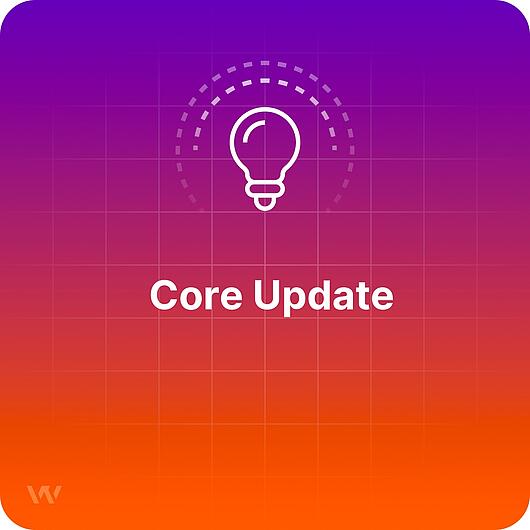- Why Us?
- Features
White Label
For SaaS Platforms & Agencies
Provide our complete analytics suite to your clients, directly within your own interface and with your/their own branding. Discover Analytics-as-a-Service and White Label Analytics. Great benefit, minimal effort.
- Pricing
- White Label
- Success Stories
- ResourcesGetting Started
Core Update

TL;DR
A core update happens when Google adjusts its core search ranking algorithm, usually in order to adapt to new situations that may affect the relevance and usefulness of the search results they provide. A core update is usually rolled out 3 or 4 times a year and can impact a great deal of websites, in terms of their rankings.
What is a core update?
Google is constantly updating the algorithm it uses to rank websites based on their relevance. While some updates are small in terms of the number of websites that are affected by it, others are major updates that change the way websites are ranked more significantly. These are called core updates, as Google is adjusting its core search ranking algorithm in order to maintain the highest standards of relevance and usefulness in their search results. Google usually makes these updates public. They occur 3 or 4 times a year and the effects are that many websites either rise or fall significantly through the rankings, in a short period of time.
Examples of major core updates
What has made Google the giant of search engines is the constant effort to adapt the search algorithm to be able to distinguish truly relevant websites from websites who were trying to trick their way to the top of the SERP.
As tricksters and spammers would find new ways to cheat, so would Google update its’ core algorithm to put them back in their place. Some of the core updates that had a huge impact on search results were:
Panda update (initial release - February 2011) - this was a major update, that involved penalties for websites with thin content (very little text and resources), with duplicate content or low-quality user-generated content, with a low domain authority or websites making false promises in their description. It also brought penalties to websites with a high ad-to-content ratio and others.
Penguin update (initial release - April 2012) - this update targeted two types of black-hat SEO practices and the “misbehaving” websites received an algorithmic penalty because of that. Websites doing unnatural link building to artificially pump up their authority were penalized. The same happened to keyword stuffers, who would use a great deal of repetition in their texts, to deceive Google robots and make the website appear more relevant than it really was in relation to certain keywords.
Hummingbird update (initial release - August 2013) - unlike the two updates above, this one was more likely to help certain websites than to incur penalties on them. This update focused on semantic search and the need to understand the intent of the search query. Is the user looking to buy something or is he/she looking for product reviews? Is he/she asking a question? Google would try to look directly for a website answering that question.
Recent core updates
As of the time of writing, the most recent known core update was made in September 2019. While there is not much official data about what has changed with the update, it has been known to further affect the medical and health sector. Google has been making a lot of changes in this domain, in an attempt to distinguish between websites that publish medical material that is in line with scientific consensus versus alternative medicine websites that often make claims that are not backed by science. At the same time, recent updates have been tweaking the role of the new Google Discover, with websites seeing a lot of volatility in terms of clicks from this feature.

